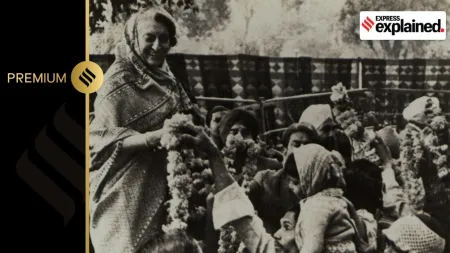The Foreign and Commonwealth Office (FCO) has launched a digital archive capturing the stories of 175 men from across 11 countries who laid out their lives for the sake of Great Britain and acquired Britain’s highest award from bravery, “the Victoria Cross”, in the course of World War I.
“Behind every name engraved on the memorial plaques is a truly remarkable story. It is fitting that we pay tribute to the Victoria Cross recipients from overseas by bringing their stories together in this digital archive,” said FCO minister Hugo Swire.
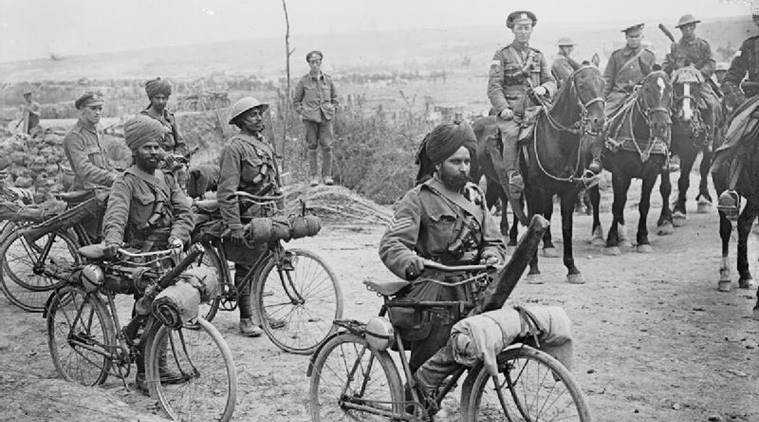 The contribution of Indians to Britain’s efforts in the World War is often conveniently forgotten by both British and Indian historians. (Source: Wikimedia Commons)
The contribution of Indians to Britain’s efforts in the World War is often conveniently forgotten by both British and Indian historians. (Source: Wikimedia Commons)
Out of 175 men listed, six are Indians. The contribution of Indians to Britain’s efforts in the World War is often conveniently forgotten by both British and Indian historians. In recent years though, there has been a recurring effort by British politicians to recognise and pay respects to the brave hearts from the Empire who fought selflessly in the great war.
India’s contribution to the war
India’s contribution to the war was the largest, as compared to any other Commonwealth country. By 1918, India had sent out approximately 1.3 million soldiers in service of their colonial masters. A majority of those recruited were from the North and Northwest parts of the country.
Living under acute duress in trenches of Europe, Mesopotamia, North and East Africa, these soldiers fought valiantly to stop the Axis powers from progressing. The Indian Jawans were the ones who stopped the Germans from advancing at Ypres, soon after the war broke out in 1914. Nearly 7,00,000 of them fought in Mesopotamia against the Ottoman empire which had allied with Germany.

Watch Video: Indian troops in Greece (1910-1919) (Source: British Pathe)
The princely states of the British Empire raised the “Imperial Service Troops”, placed at the disposal of the Viceroy. The native princes, in fact, competed with each other on how much each could contribute in a bid to impress the colonial overlords.
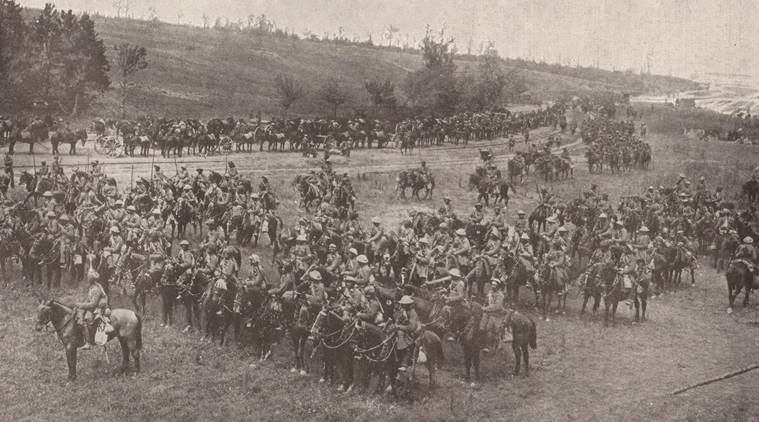 The princely states of the British Empire raised the “Imperial Service Troops”, placed at the disposal of the Viceroy. (Wikimedia Commons)
The princely states of the British Empire raised the “Imperial Service Troops”, placed at the disposal of the Viceroy. (Wikimedia Commons)
Sir Pertab Singh, the Regent of Jodhpur, volunteered to go to the front while the Maharaja of Bikaner offered 25,000 men and noted that “I and my troops are ready to go at once to any place either in Europe or in India or wherever”. The Maharaja of Mysore made a contribution of Rs 50 Lakhs. Contributions were also made in the form of clothes, food and religious textbooks for the sake of the troops deployed abroad. Further, from 1917, units of Indian Labour Corps were dispatched to the Western Front to load and unload ammunition, chop down trees, construct roads and help with other building projects.
Recruitment in British Army- A matter of great pride
When the British announced war on August 4, 1914, Indians considered it their duty to defend the interests of their colonisers and support the ‘British fight’ with their ‘life and property’. The Indian National Congress and the Muslim League pledged allegiance to the war efforts of Britain. Mahatma Gandhi went about strongly urging citizens to be a part of the war cause. In Gandhi’s words, “Home rule, without military power was useless and this was the best opportunity to get it.”
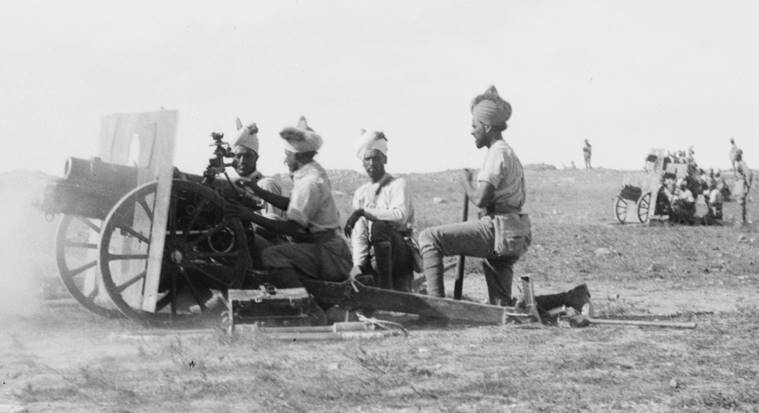 When the British announced war on August 4, 1914, Indians considered it their duty to defend the interests of their colonisers and support the ‘British fight’ with their ‘life and property’. (Source: Wikimedia Commons)
When the British announced war on August 4, 1914, Indians considered it their duty to defend the interests of their colonisers and support the ‘British fight’ with their ‘life and property’. (Source: Wikimedia Commons)
Military recruitment was largest in the North and Northwest parts of the country, where the British theorised that superior races were inhabiting. The ‘martial races theory’ propagated by the British made it appear like a matter of great pride for Indians to be on the war front. It was also argued that the war provided an optimum opportunity for Indians to prove themselves as worthy members of the Empire and gain respect from the British as equal citizens.
This narrative also helped them tide over the hurdle posed by the discomfiture Hindus had towards crossing the seas, which many considered would pollute them.
Watch video: Gurkhas (1914-1918) (Source: British Pathe)
The undying loyalty with which Indians served in the British army is evident from a number of letters written by those living a life of extreme hardship in the army trenches. These letters have been archived in the British library.
In a letter written by Nawab Khan in Brighton to Mian Qasim Shah in Peshawar, he says:
“As for the war, the German King is becoming very very very very weak weak weak. We expect that our glorious King will shortly gain the victory.”
Letter from Nawab Khan to Mir Qasim. (Source: British Library Digitised Manuscripts)
Letter from Sepoy Waris Khan, 22nd regiment, Nowshera to Sepoy Hazir Khan, 89th Punjabi in France (Source: British Library Digitized Manuscripts)
Anguish and loss in midst of undying loyalty
Heavy casualties were incurred by the Indian armed forces. Approximately 53,486 died, 64,350 were wounded and 3,769 were missing or taken prisoner. Hundreds of them died in Neuve Chapelle while more than 1,000 died in Gallipoli. According to one government report, 3,427 lascars lost their lives, representing 6 per cent of the total shipped out of Bombay and Calcutta.
When in the camps, the soldiers wrote about their life of misery in the letters to their relatives and friends back home. One of them recounted with horror,
“Poisonous gases, bombs, machine guns which fire 700 bullets per minute, large and small cannon throwing cannon balls 30 Bengali maunds in weight, Zeppelins, large and small flying machines which throw bombs from the air … liquid fire that causes the body to ignite.”
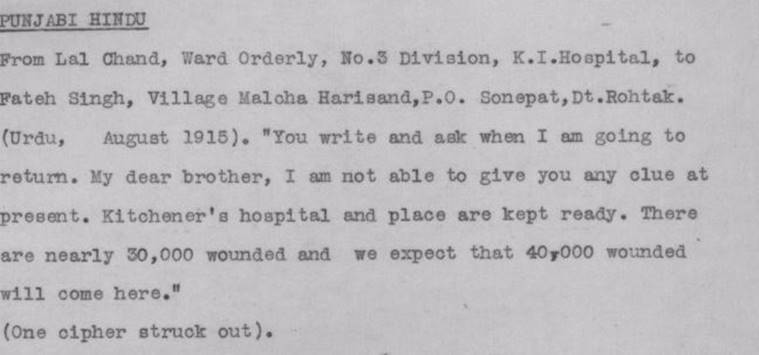 Letter from Lal Chand, Ward Orderly, No. 3 Division, K.I. Hospital, to Fateh Singh in Sonepat (Source: British Library Digitized Manuscripts)
Letter from Lal Chand, Ward Orderly, No. 3 Division, K.I. Hospital, to Fateh Singh in Sonepat (Source: British Library Digitized Manuscripts)
Often on, the letters would convey that when a brigade was attacked, it was always the Sikhs and Gurkhas who went first, followed by the white men.
Also from Express Research: World Refugee Day: Five human influxes that have shaped India
However, despite the injuries and sufferings, at no point does one come across evidence of disloyalty to the British Crown. For the soldiers in the Front, their honour was bound up to the Crown’s victory.
Treatment of Indian soldiers in the British army
Once the war was over, British historians hardly ever glossed over the contribution made by its Empire. Further, these soldiers remained neglected by the Indian historians as well. partly because the war efforts were at in contrast to the nationalist cause. It was assumed that the soldiers were servicing the very Empire that was oppressing citizens at home.
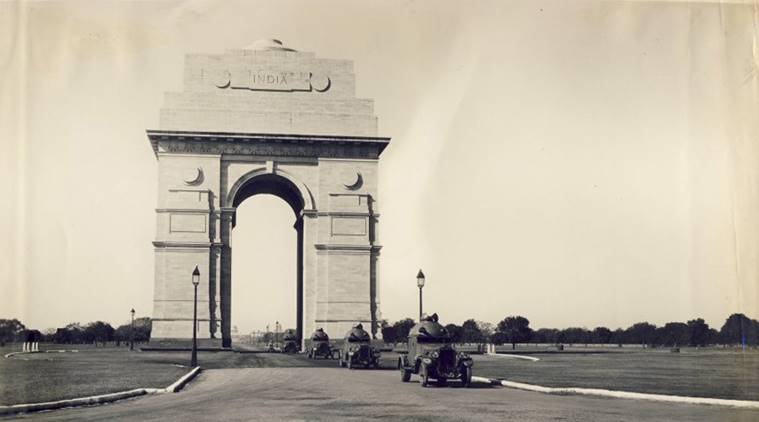 India Gate in the 1930s (Wikimedia Commons)
India Gate in the 1930s (Wikimedia Commons)
The only memorial in India commemorating the Indian soldiers in the First World War is the India Gate, constructed by the British in 1931. In June 2014, the UK government handed over a hand crafted bronze plaque in memory of Indian soldiers in the world war to the British High Commission in New Delhi. The plaque was a symbol of Britain’s gratitude.
Watch Video: George V reviews Indian troops (1910-1919) (Source: British Pathe)
In recent years, there has been some effort by historians and archivists in India to shed light upon the lives of these soldiers. The centre for Armed Forces Historical Research in Delhi is assiduously trying to recover annals of the soldiers who fought to defend what they firmly believed as their national interests.





